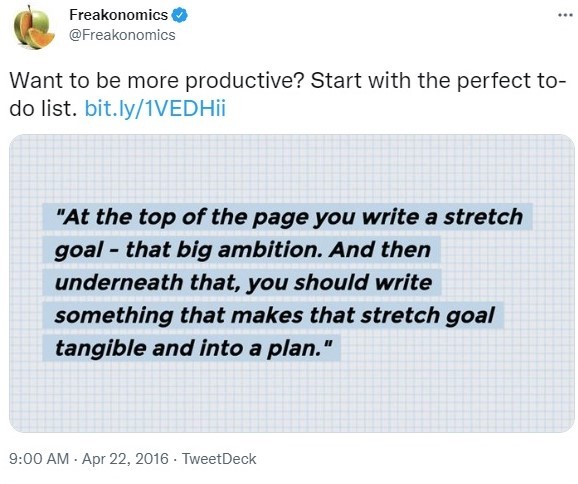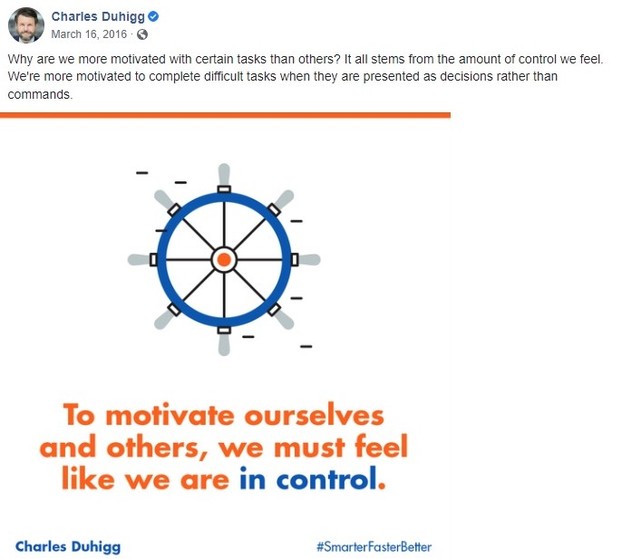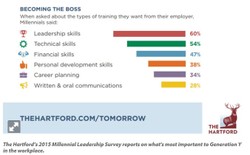Boosting Productivity Adds Mental Smarts to Technological Apps
Financial success and personal development are attainable through boosting productivity by controlling thoughts, fine-tuning focus and identifying appropriate goals, according to an article published in the May 2016 issue of Money magazine.
The information becomes a reader-wide share with Scott Medintz, greater New York City area-based content strategist, editor and writer, publishing “Simple Steps To Get More Done.” It comes from interviewing a productivity expert who is both bestselling author of The Power of Habit and Pulitzer Prize-winning reporter for The New York Times.
Charles Duhigg describes his investigations in Smarter Faster Better, published by Random House on March 8, 2016, and his observations in the interview for Money magazine. He explains, from personal experience, that “Anyone can learn to become more productive” since “The key is that you have to learn how your brain works.”
*****
Websites:
http://business.time.com/author/smedintz/
http://charlesduhigg.com
*****












 Are Hawaiian Huakai Po Nightmarchers Avenging Halloween Thursday?on 10/02/2024
Are Hawaiian Huakai Po Nightmarchers Avenging Halloween Thursday?on 10/02/2024
 Mailing Addresses for 2023 Form 4868 Extending 1040 and 1040SR April 15, 2024, Due Dateon 04/15/2024
Mailing Addresses for 2023 Form 4868 Extending 1040 and 1040SR April 15, 2024, Due Dateon 04/15/2024
 Mailing Addresses for 2023 Forms 1040 and 1040SR Filed in 2024on 04/15/2024
Mailing Addresses for 2023 Forms 1040 and 1040SR Filed in 2024on 04/15/2024
 Mailing Addresses for 2022 Form 4868 Extending 1040 and 1040SR April 18, 2023, Due Dateon 04/13/2023
Mailing Addresses for 2022 Form 4868 Extending 1040 and 1040SR April 18, 2023, Due Dateon 04/13/2023



Comments
The computer crashed before I communicated another component of the comment immediately below, in answer to my previous observation and question.
The stewardship orientations in boosting productivity for individual and beyond financial success and for individual and beyond personal development delight me because of drawing on sentient animal-like use of our resources.
Sentient animals and plants keep away from wasting resources and time so why shouldn't we also?
My favorite takeaways are the sentient commitments and the stewardship orientations that assure us of productivity boosts that avow financial success and personal development.
The first-paragraph first sentence to the first subheading, Boosting Productivity Becomes Matters of Self-Motivation and Self-Questioning, alerts us that "Boosting productivity follows from understanding the brain, focus and goals, not from using apps since the interview reveals that “Technology that was supposed to help, didn’t."
That sentence counsels us to conserve our human-sentient aspects against the alleged truth of Murphy's law about anything possibly coming out wrong indeed comes out not at all right for the person or persons under its common sense or its curse.
Doesn't not disdaining -- after diligent discernment of how, what, where, who, why -- what our brain, our focus and our goals deliver direct us to what draws us ever less distantly from our personal and professional destinies as human sentients doing dazzling deeds for those who dwelt here afore us, those who dwell around us, those who dwell after us?
The third-last sentence advises us that "Budgeting and economic decision-making and financial and retirement planning require committing numerical and textual information to memory and scrutinizing gains and losses, inflows and outflows."
Economic, effective, efficient use of our resources belongs among any gain-and-loss, inflow-and-outflow scrutinization.
The film Paddington enchants me even as I find quite unfavorable the scene with him fitting some oranges into an edible pile, other oranges into an inedible pile. Paddington looked rather too picky about oranges that figured -- at least photogenically -- quite edibly likable.
Mustn't our and contemporary animal-, place-, plant-well-being matter now and mustn't the same matter for future animals, people, places and plants?
Wise use of our animal, place and plant sentients and of ourselves offers the opportune-ist, optimal-est orientation to such afore-observed occurrences?
The computer crashed before I concluded another component to my observation and question in the comment box immediately below.
Self-controlling, self-motivating, self-questioning, self-visualizing direct one toward reasons for and results from doing what one does proactively productively, not reactively (nonproductively).
The last-sentence quote above about identifying "patterns in ways that you can use to make better decisions" is perhaps among the most impacting and significant of all the many impacting, significant statements in the book.
Those patterns include how other people influence what one intends.
So memorizing necessary information, noting gain-loss and inflow-outflow patterns and self-talking, self-writing not only one's own data-, event-, idea-interacting but also people-interacting mindsets, priorities and results move self-controlling, self-motivating, self-questioning, self-visualizing into maintaining that when decision-making must be communal, more than just oneself, mightn't it?
The first two sentences under the second subheading, Boosting Productivity Clusters Bad and Good Decision-Making Experiences, advise us that "Parents often keep clear lists of acceptable and unacceptable uses of allowances “to teach our kids the right things to do – but it’s the wrong instinct.” Boosting productivity instead leads to children deciding since 'it’s important that they learn what it feels like to make decisions, even if they’re sometimes bad ones.'"
The self-questioning component in this productivity-boosting prescription must be applied carefully as well to decisions decided and done. Being comfortable making decisions must be one attainment even as not just making one bad decision after another without hope for change must be another, correct?
The Money magazine article that generated my wizzley gives a game plan that goes well not only professionally but also personally.
Is not self-controlling, self-motivating and self-questioning an orientation that inspires happy, healthy interactions in play and work?
Perhaps the abovementioned trio inspire personal and professional development by an implied fourth component, self-visualizing!
katiem2, Thank you for revisiting! And thank God that excellent writers like you are involved in the self-education, self-improvement movement online and off.
The online self-education movement is currently booming. This is a pivotal moment in the entire world and it is information like this that aids in our ability to evolve. Did you imagine this would be so vital in years to come? Glad it has!
katiem2, The Garden Media Group's Garden Trends 2017 reports says that Millennials are quick to turn to, and learn from, in-person and online courses on just about anything and everything! Why not? It's right at their fingertips.
I heard adulting classes are on the rise because we no longer teach our youth about life skills like writing a check, home economics, basic household chores, mechanics and on and on money is vital knowledge to obtain.